Revised from the book Little Lame Walter, by N. I Saloff-Astakhoff, published by Grace Press, Inc.
Walter’s War
Part One: A Cripple
A cripple. How Walter hated those words! Once he had turned to his mother’s loving arms when the others had teased and ridiculed him. But little lame Walter had been quite small when she had died, and no one else seemed to care. Poor Father was often gone, trying to provide for his large family. So Walter was left to be kicked and ignored by his new step-mother and cruelly teased by the other children. “That’s mine, Cripple!” his older brother taunted, snatching away his food. In anger little Walter would try to hit back, only to be shoved aside as the hungry children ate their scanty meal.
Life was hard without enough to eat and few clothes to wear, but selfishness and fighting made it almost unbearable. Often the young boy would limp off to hide his bitter tears. Why, oh why was I cursed with a lame foot? Walter asked angrily. Why does no one care? But as time went by, the tears dried up. A hard shell grew around Walter’s hurting heart and he learned not to care. It seemed to be the best kind of armor to keep him safe. And deep inside his bitterness grew into hatred. Walter wasn’t going to be trampled on any more—he would fight for himself and get revenge! Walter’s war had begun.
Walter learned to be sneaky. Why should he wait for others to grab his food, when he could go into the pantry and fill his pockets when no one was looking? “Thieving rats,” his step-mother cursed, as she looked for the missing apples or barley rolls. From his hiding place behind the door, Walter shook with silent laughter. Each day he delighted to find new ways to annoy the busy woman, or to make the other children suffer. It wasn’t long before he was hated and blamed for anything that went wrong. “Cripple did it!” the others would chant when the chicken coop was left open or the coal bin tipped over. That only made Walter’s anger boil hotter. If they thought he was bad, he would show them!
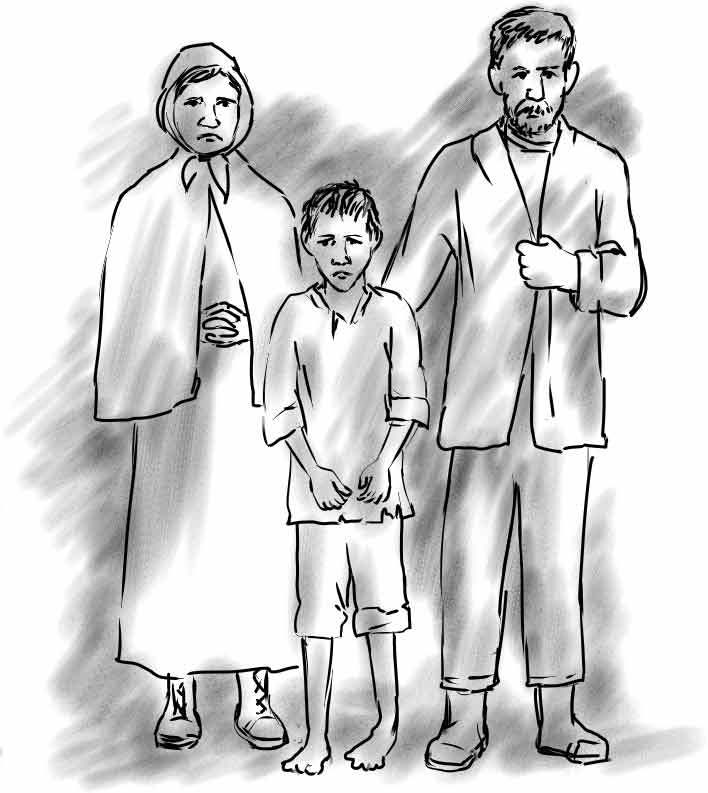
And he did. Life became more and more miserable, until one day his step-mother said she’d had enough. “Get that Cripple out of here—he’s worse than useless!” she told Father. “I can’t do a thing with him haunting the house with his evil pranks!” So it was decided that nine-year-old Walter should be taken to the orphanage. Ragged and a little bit scared, the lame boy stood in the clean office and studied the man at the desk. “I’m sorry, but we only take orphans,” the man said, shaking his head. His kind face seemed troubled, but after a long talk with Father he agreed to consider the matter. Walter was almost surprised when Father took him back two weeks later. “These kind people have promised to take care of you,” Father said. “You will have a better life here.” As Walter limped inside, he wasn’t so sure.
A warm bath and new clothes were the first things given to the poor boy. “And here is your bed,” a smiling lady told him. “Call me ‘auntie’—all the other children do.” Walter was caught off-guard. The love and kindness was hard to fight against, and for the first few weeks he simply enjoyed it. There was food enough for everyone, and all the children were treated with gentleness and patience. “Papa,” the manager of the orphanage, always seemed to have time to talk to them and listen to their needs. The most amazing thing of all to Walter was that no one called him “Cripple” or even made fun of his lame foot. “Our Lord Jesus loves all people, and so do we,” Papa told him. “He tells us to help the weak and not to please ourselves, and that is how we live in this home.”
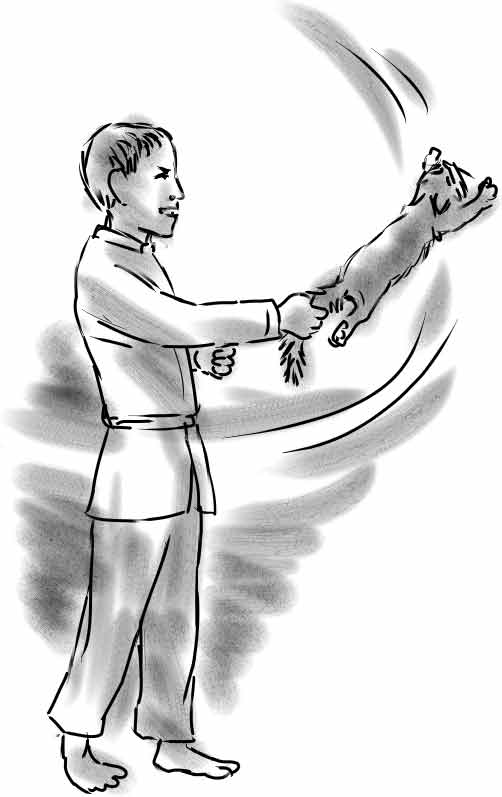
Walter liked the love and attention. As he got used to his new life, he dropped his shyness and began to enter into the games and activities of the other children. And, once again, he began to plot ways to fight his war of bitterness and revenge. It was easy for him to see where he could cheat and get his own way. After all, he’d had a lot of practice. Since Walter was older than most of the children, his trickery and mischief soon won over some devoted followers. “Know what cats are good for?” he would say with a wink, taking one by the tail. “A sling-shot!” and off the poor creature would fly as he swung it around in the air.
As the months went by, “Papa” and the “aunties” were disturbed to find that Walter was a ringleader in all kinds of pranks and trouble at the orphanage. Worst of all, he never seemed to be sorry or want to change his ways. “You must not take food from the others,” Papa told him. “And I do not want to hear of animals being treated cruelly or the other children being cheated when you play together. Jesus commands us to love others and do to them as we would want them do to us. Would you want someone to take your things?” Walter shrugged, uncaring. He had long ago stopped wanting to please others.
Even the kind man’s tears and prayers for him only made him angry. Why didn’t he just leave him alone? He didn’t want to soften his heart to anyone or give up fighting. And the more that he learned about this Lord Jesus that Papa and the others served, the more sure Walter was that Jesus’ way was not for him. Love your enemies and forgive those that hurt you? Walter didn’t want to do that! His war was full of bitterness and hate. Jesus was on the opposite side, and he wasn’t going to give in.
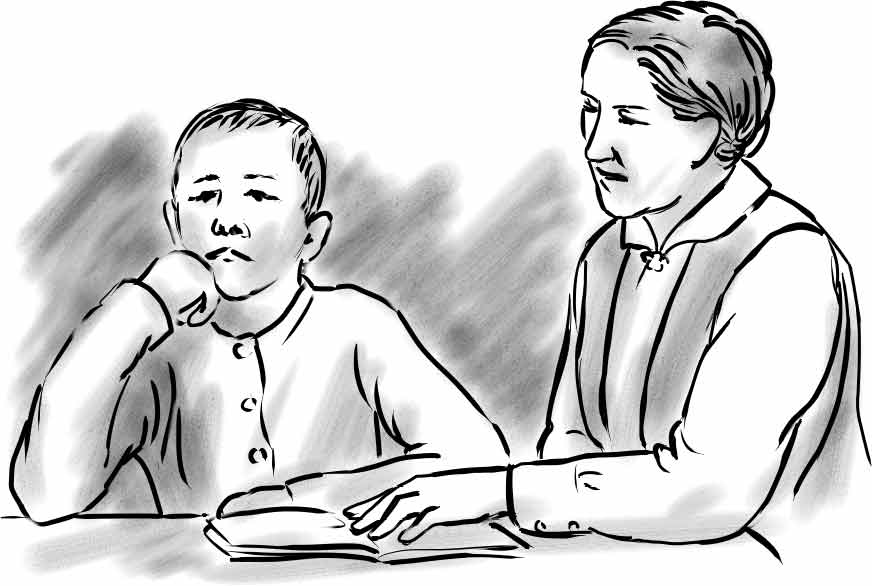
The more that love and kindness was shown to Walter, the meaner and harder he became. His favorite activity was making life difficult for others. “Walter, everyone needs to help clean up,” one of the aunties would say. “Let’s see if we can surprise Papa!” But Walter would drag his feet and get in the way. “How can we teach that boy anything? He acts like he is stupid and doesn’t even seem to try,” he heard the teachers saying, and smiled to himself. They couldn’t make him do anything he didn’t want to do. All their pleadings and prayers wouldn’t win him over.
Two years went by and a new government took over the land. “Down with tyranny! All are equal!” the Soviet Socialists chanted. Walter liked the sound of it. But Papa and the aunties seemed worried. And for good reason. The Soviets were determined to run the country without God, and that included the orphanage. But Papa wouldn’t give in to their demands. “You must decide at once what you will do!” they told Papa at last. “You will remove God from the orphanage, or we shall throw you out, together with your gods!” Walter felt strangely excited. He was ready for change.
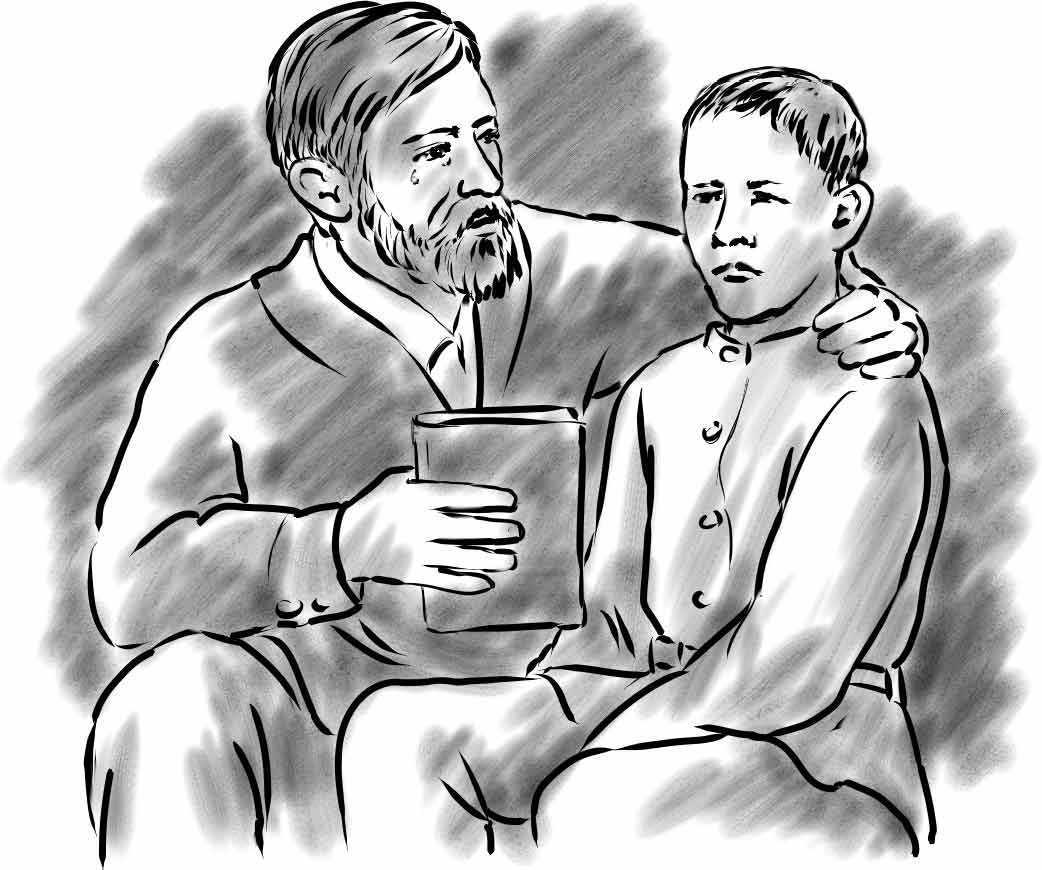
One day Papa called the children together and spoke to them soberly. “Soon I will no longer be here to care for you, so I want to give each of you a gift.” When it was Walter’s turn, the kind man led him into his room and sat him down on his lap. Walter tried to avoid the earnest tear-filled eyes that seemed to look right into his heart. How he wished he could run far away and hide! But Papa hugged him close and kissed his forehead and cheeks, before handing him a well-bound book. It was a New Testament and Papa urged him to read it. “Let God change your heart so you can be what God wants you to be, Walter,” he said. That wasn’t the change Walter wanted at all! He was much more interested in throwing the horrid gift away. As Papa hugged him good-bye, he stood stiffly and didn’t smile. But Papa’s parting words kept ringing in his ears. “Never forget that I love you, my child. Never forget God loves you. Whenever life is hard for you, remember that we are praying for you.”
“I’m glad that you and your unbearable prayers will soon be gone!” Walter felt like shouting back. But something held his mouth shut. Angrily, he turned away, shutting out those loving eyes from his view.
It wasn’t long before they were taken forever out of his sight. Two weeks later the Soviet Socialists came to take charge of the orphanage. Walter could feel the hate and scorn as the woman manager took command and loudly ordered Papa to leave. There was no good-byes or even a chance to get his things, for in a moment two armed men hauled him out the door. A sudden twinge of sadness came to Walter as he saw his kind friend so rudely treated. Despite the angry shouts of the new manager, Walter pushed outside to get near Papa. He felt the strong hand pat his head one last time as the kind man said, “I hope to hear a good report of you some time.” Looking up, Walter saw tears flowing down Papa’s cheeks and he felt a sudden pain pierce through the hardness of his heart. “Don’t leave!” he choked, but he could not keep the carriage from taking Papa away. As it drove out of sight down the road, the boy felt like something good and wonderful was leaving him forever.
The days that followed were miserable ones for the twelve-year-old boy. The shrill voice of the Socialist lady now stabbed the halls of the once-peaceful home. Instead of prayers and hymns of praise to God, the children were taught to praise the government and sing about the new revolution. Harsh orders and discipline replaced the loving instruction once given them. But the new staff seemed more interested in entertaining guests than teaching the children, and much of the day they were left to themselves. Most of them were glad to do what they pleased, especially since they were never punished for being naughty or wicked. But somehow the new order of things brought no pleasure to Walter. There was no love and peace in the home now, and he felt it deeply.
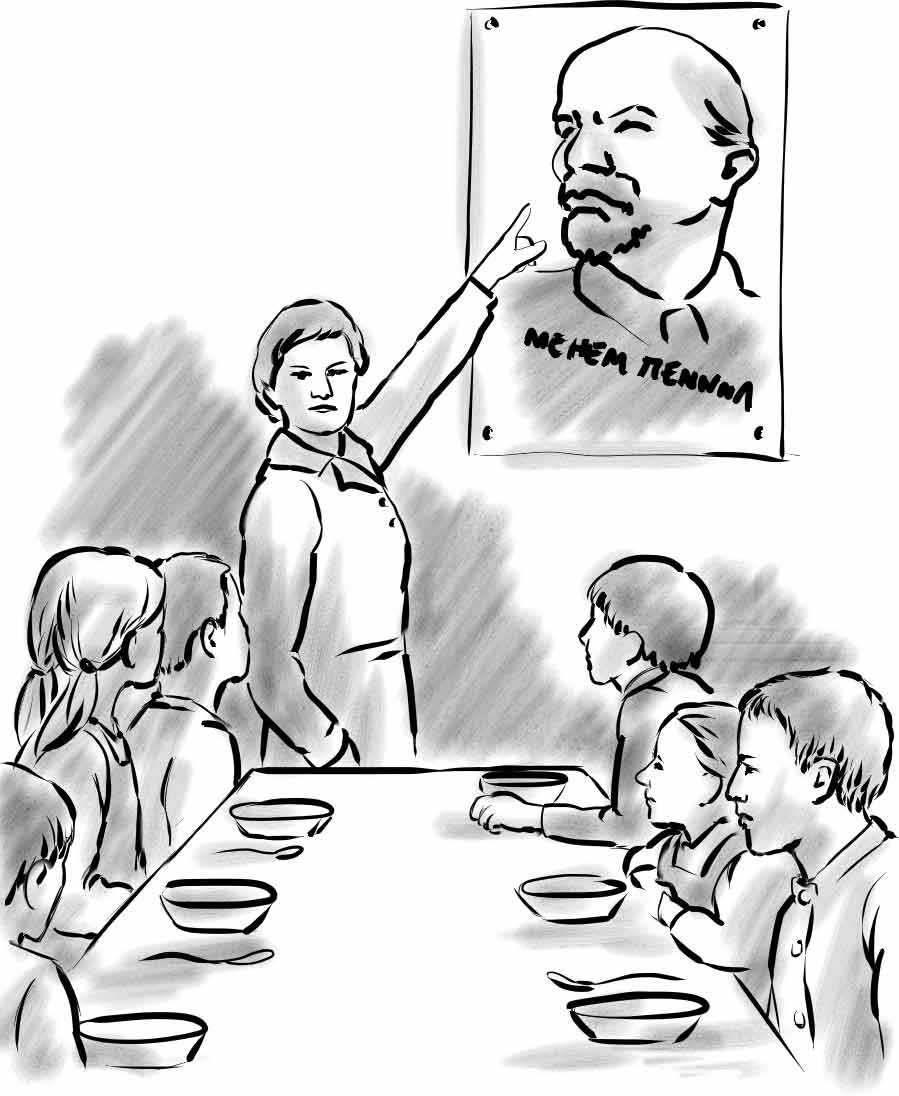
Instead of leading the mischief and trouble as before, Walter often sat alone and thought about the changes in his life. He realized that the new management was doing everything opposite of what Papa and the aunties had taught them. “Pray to God,” they told the children when it was time to eat, but no food was given to them. “You see, God is not real,” they explained. “We will pray to Lenin. He is the friend of all poor people.” And when they did, the food was set on the tables. Walter watched and listened, but he was not convinced. He did not like the hard face of the manager, or the late night parties she would have when all the children were in bed. If they were friends of the children, why did they keep most of the food for themselves? The home was falling into a miserable condition of disorder and filth. No, these people did not care for them—certainly not for him, the poor cripple!
“These people are selfish and harsh simply because they do not believe in God,” Walter decided. “And it was just because Papa and the aunties served the Lord Jesus that they cared for each of us so tenderly. If only Papa had not left us!” The hate Walter had felt toward the kind man was turned to bitter shame, as he remembered the day Papa had given him the New Testament. “I have been just as evil and selfish as these new managers are,” he realized suddenly. “Don’t I hate Jesus and all that Papa taught us about Him? Surely I am just as bad as they are!” With this thought, the hard wall of bitterness around Walter’s heart caved in on him. Pain and longing seemed to pull him apart, robbing the lame boy of peace and rest.
One day Walter limped off to the farthest corner of the orchard to be alone. But he could not escape the awakened voice of his conscience—nor the terrible ache that filled his heart and choked his throat with tears. Climbing through a tangle of weeds and bricks, Walter crept into the cool shadows of an old cellar. He threw himself down and leaned his hot forehead against the cold stones of the floor. “My life is hopeless now!” he groaned to himself. “Life is miserable without love,” whispered his conscience, as hot tears spilled down his cheeks. “But this is what you have been fighting for, isn’t it?” The quiet voice continued, piercing his very heart. “Jesus said that if you don’t forgive, you will not be forgiven.” Walter sobbed until it seemed that all the years of bitterness and hate had melted into a puddle around him. At last the despairing tears quieted and he felt an invisible presence come close to him. Walter knew who it was. It was the Lord Jesus, whom he had been fighting against for so long.
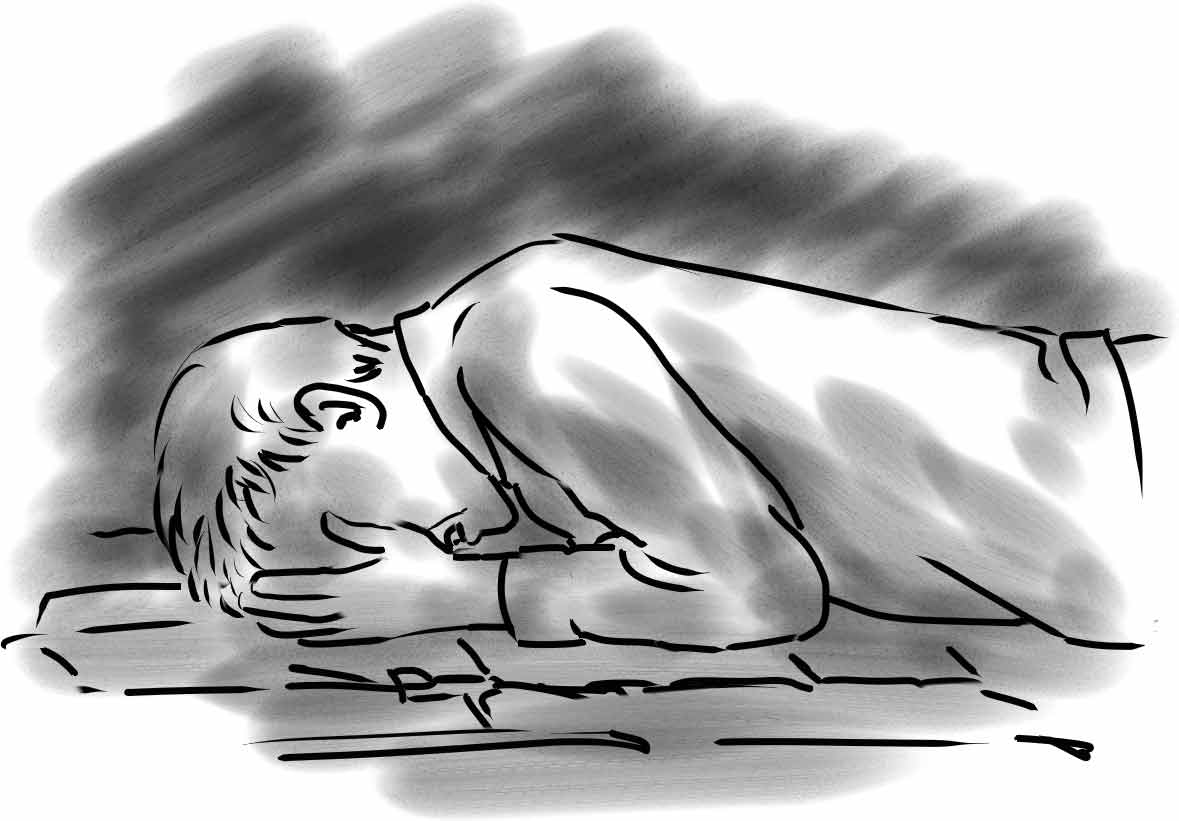
“Please forgive me, dear Jesus!” he prayed. “You see me—the wicked boy. You know I did not love You, nor Papa, or any of the others. You know all the wicked and naughty things that I have done, but You died for me, so please forgive me—oh, please forgive me!” The words spilled out brokenly, as the lame boy prayed his first prayer. He was giving up the war of hate that had crippled him for so long. As he surrendered to the love of Jesus, Walter’s heart filled with a new desire. “I want to serve You, and only You, Lord Jesus, for I want to love you with all my heart!” he cried. “I do want to be good and obedient, and not to cause trouble anymore. Please help me to be good.”
For a moment Walter knelt in the shadows, waiting. Then he remembered a Bible verse that Papa had once taught them. “Wash my heart with Your blood so I will be clean and white as snow,” he whispered. “I am only a poor lame boy, whom nobody loves—except You and Papa. But they have driven Papa away, so please stay with me, dear Jesus.”
When Walter finally climbed back up into the bright sunlight, a wonderful peace filled his heart. For the first time he had truly given up his will in repentance, and the cold bitterness was gone forever. Joy tingled through him as he looked about at the stately trees and blooming lilacs. Had he ever seen anything so beautiful before? Jesus had made them all because He loved him—yes, it was the most wonderful day of the lame boy’s life!
Walter hardly noticed his limp as he walked slowly back to the house, for it seemed that Jesus Himself walked beside him. His heart sang along with the birds and everything seemed glowing with light. But best of all, Walter realized that his heart was full of a sweet gentleness and desire to do good to everyone. “Lord Jesus, help me to bless the other children,” he prayed. “And certainly the new workers need to know Your love. Show them Your love, as You have shown me!” How totally different from the hard, selfish boy that once had been Walter. The old war of bitterness had ended at last. Love had conquered hate in the old cellar, and now a new war had begun. Today Walter had joined the army of love in the service of the Lord Jesus.
See also: Part Two